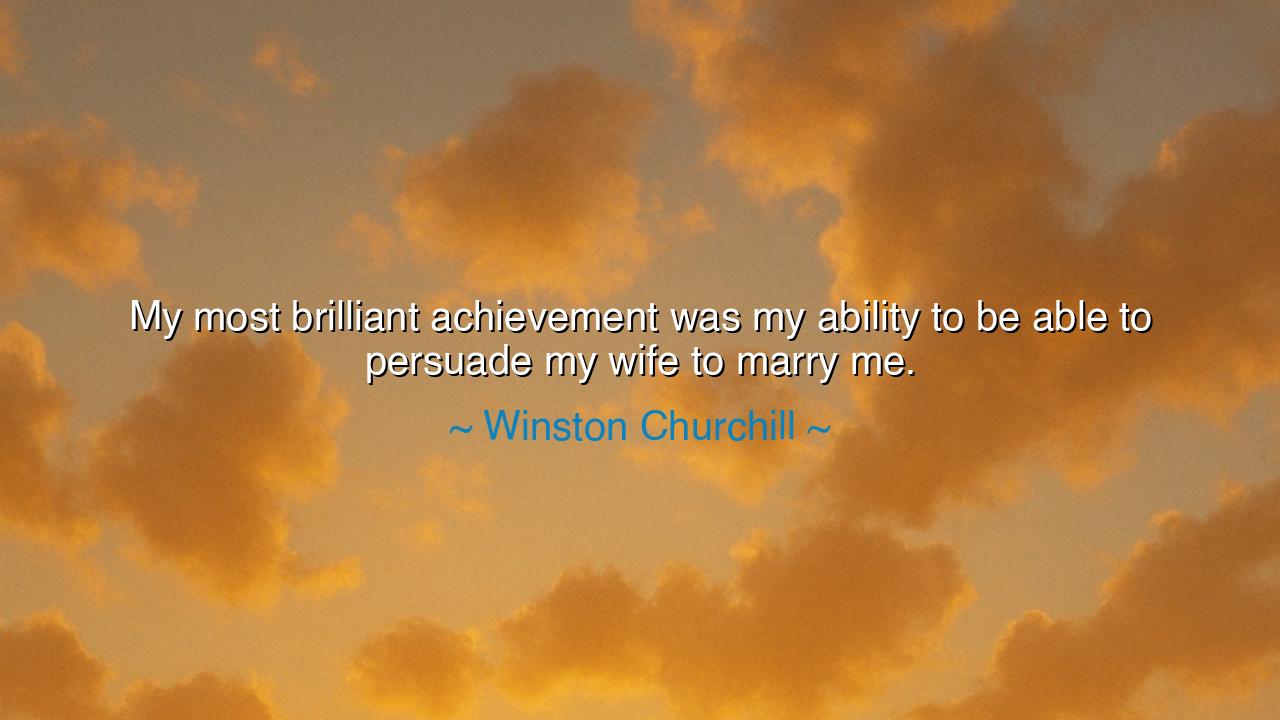
My most brilliant achievement was my ability to be able to
My most brilliant achievement was my ability to be able to persuade my wife to marry me.






When Winston Churchill said, “My most brilliant achievement was my ability to be able to persuade my wife to marry me,” he spoke not as the lion of war or the master of politics, but as a humble man in awe of love’s quiet victory. These words, laced with humor and sincerity, reveal a truth that transcends power and glory: that the greatest triumphs of life are not won on battlefields or in parliaments, but in the heart of another human being. Churchill, who commanded nations and faced down tyranny, confessed that his proudest conquest was not over enemies, but over the hesitations of love. In this confession lies a wisdom the ancients would have called sacred — the recognition that affection, loyalty, and companionship are the crowns of a mortal’s existence.
In the style of the ancients, one could say: even the mightiest warrior kneels before the altar of love. For love is the only power that humbles kings and elevates the lowly. When Churchill declared his marriage his “most brilliant achievement,” he spoke with the humor of a man who knew the limits of his own greatness. He had faced war, politics, and public judgment, yet he knew that to win the enduring devotion of another soul — and to keep it through storm and fire — was a victory greater than all medals or titles. To persuade a heart, after all, is a work of both courage and grace.
The origin of this quote reflects Churchill’s deep affection for his wife, Clementine Hozier, whom he married in 1908. Their union endured for over five decades through two world wars, political turmoil, and personal trials. Behind the image of Churchill as a man of iron will stood Clementine’s quiet strength — her wisdom, restraint, and compassion tempered his volatility. He often sought her counsel before great decisions; she was, in truth, his anchor and mirror. Thus, his words were no mere jest but a tribute: he understood that without her, his brilliance might have burned itself out. To win her heart was not just romance — it was salvation.
In this, we see reflected the ancient harmony of partnership, that divine balance between strength and wisdom, passion and patience. Throughout history, the greatest men and women have not stood alone, but alongside a counterpart who steadied their course. Marcus Aurelius had his Faustina, Abraham Lincoln his Mary, and Churchill his Clementine. Love, in these unions, was not an ornament to greatness but its foundation. For as the sages taught, man’s outer triumphs crumble if the home is in discord; but when love rules the heart, even the harshest destiny becomes bearable.
Churchill’s words also remind us of the humility that true greatness requires. Here was a man who led nations through darkness, yet he called his marriage his finest work. Why? Because leadership commands obedience, but love cannot be commanded — it must be earned. Persuasion in love is not conquest; it is communion. It is the art of revealing one’s soul with honesty, of showing tenderness without losing strength. To win love through sincerity, rather than power, is the mark of a heart that understands its own limits and dares to seek companionship in vulnerability.
There is humor in Churchill’s tone, yes, but also reverence. His remark teaches that no matter how high one climbs in fame or fortune, the measure of a life well lived is found not in public applause but in private devotion. In the eyes of the world, Churchill saved civilization; in his own eyes, he was simply a man who had found a woman willing to share his destiny. Such humility is the essence of wisdom — to know that the things of the heart endure longer than monuments of stone or words of statecraft.
The lesson is timeless: cherish the love that chooses you. Do not take for granted the one who walks beside you through the long corridors of life. The world may reward intellect, ambition, and might, but it is love that gives meaning to those victories. If even Churchill — who shaped the fate of nations — could call marriage his highest achievement, then we must remember that affection, loyalty, and understanding are not the quiet parts of life; they are its very crown.
So let this truth be passed down: the persuasion of love is the greatest art of all. It asks no armies, demands no speeches, and wins no elections — yet it conquers the human soul. To earn the devotion of another, to build trust, to endure together through hardship and joy — that is the true brilliance of a life. And in that sense, Winston Churchill was not only a leader of men, but a disciple of the oldest and noblest victory: the triumph of the heart.






AAdministratorAdministrator
Welcome, honored guests. Please leave a comment, we will respond soon